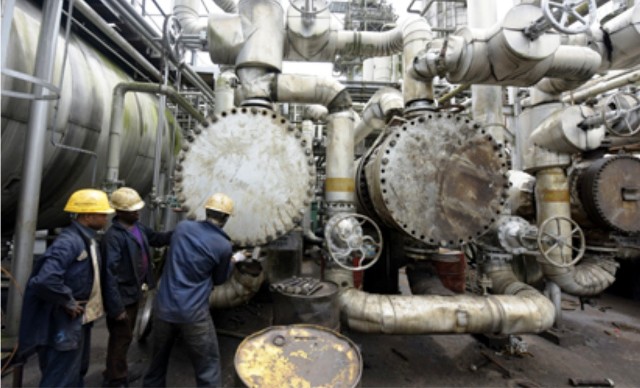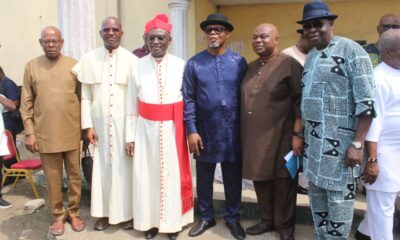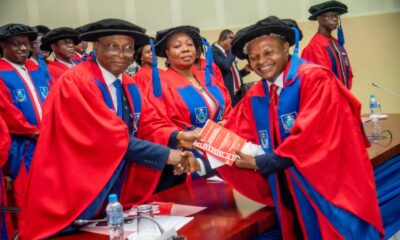Business
Deregulation: FG Moves Against Sabotage
The Federal Government yesterday moved to checkmate those who may want to scuttle fuel supply in the country ahead of the planned January 2010 take-off of the deregulation of the downstream sector of the petroleum industry.
The government through the Nigerian National Petroleum Corporation (NNPC) ordered for the importation of 90 cargoes of Premium Motor Spirit (PMS), 28 cargoes of Dual Purpose Kerosene (DPK) and 10 cargoes of Automative Gas Oil (AGO).
It again declared that there was no going back on the planned deregulation of the downstream sector of the petroleum industry and warned that erring marketers who indulge in acts that are capable of jeopardising the exercise would risk severe sanctions.
Reading the riot acts in a meeting with major and independent oil marketers and other stakeholders, Acting Director of the Department of Petroleum Resources (DPR), Mr. Mr. Billy Agha, said the DPR, an agency saddled with the responsibility of regulating the petroleum industry, had braced up with the expected challenges and had taken steps to deploy resources at its disposal to ensure that products distributed to dispensing points were monitored and made available to the public as intended.
He said the massive importation was designed to meet the country’s ever increasing fuel needs during the forthcoming Muslim and Christian festivities that will precede the January 2010 new take-off date of deregulation.
Agha reminded the marketers that they had a critical role to play especially in products distribution and supply and advised them to shy away from actions that are inimical to the successful deregulation of the petroleum sector.
“NNPC has indicated that their coverage of the market is premised on the fact that there may not be supplies coming from third parties, while assuring sufficient and robust supply of the indicated products within this critical period,” he said.
Agha, who expressed concern about the sharp drop in the number of applications for permits to import Premium Motor Spirit and kerosene by major and independent marketers of product, appealed to the marketers to take it as “sacrifice” and continue products importation to ensure availability of adequate supplies in the country.
He said: “It is our fear that in the event of not being able to flood the markets, as anticipated during the critical period, the supply chain will be affected which may lead to scarcity, hoarding of products, diversion and other associated ills of scarcity, the most notable of which is the reduced trucks load-out from the storage depots/facilities” .
While noting that “deregulation would phase out monopoly and allow market forces to dictate the price”, the DPR boss cautioned against hoarding and diversion of products, noting that anybody caught in such act would be punished.
“The key players should get ready for deregulation and be ready to play a critical role so that it could be a success and all of us will move on to the promise land.
There is no going back on the deregulation. The time I do not know, but what I know is that we are deregulating the sector. No going back.
“We therefore appeal to all marketers to as a mater of fact have the interest of the public at heart, and to shy away from actions that are inimical to the successful deregulation of petroleum products in the country. The DPR would not hesitate to impose the necessary sanctions on the erring marketers found violating the laws,” he warned.
Responding, the marketers complained that notwithstanding that government is yet to pay the huge amount owed them as outstanding subsidy, they had gone ahead to secure permit to import products but were not granted approval by the Petroleum Product Pricing Regulatory Agency (PPPRA).
They accused the Federal government of failing to follow due process in the deregulation exercise and of not providing the conducive operating environment that will make it succeed.
The government had recently announced that the planned deregulation initially scheduled to take off on November 1, 2009 would now kick-off by January 2010. However, marketers are of the view that a situation where the NNPC is allowed to monopolise fuel importation will create monopoly and endanger competition.
Meanwhile, Shell Petroleum Development Company (SPDC) last week resumed operations at its Soku gas plant located in Akuku-Toru Local Government Area of Rivers State, after 11 months of closure, a company spokesman confirmed yesterday.
The Federal Government lost over $180 million liquefied natural gas revenue monthly following the closure of the gas plant since November 27, 2008 as a result of the activities of militants and vandals.
The gas plant accounts for 40 per cent of the gas need of the Nigerian Liquefied Natural Gas (NLNG) Plant in Bonny Island of Rivers State. NLNG supplies 10 per cent of the world’s liquefied natural gas. Following the closure of the plant, NLNG declared force majeure on 40 per cent of its LNG supplies to European customers.
The company said over 101 vandalised points were detected on the pipelines shortly before closure. When remediation was being carried out, Shell discovered that about 200 places on the 58 kilometres pipeline had been punctured for stealing of the product.
The plant was capable of producing 577 billion standard cubic feet of gas per day but the theft of condensate, which is a by-product of crude oil, has grossly affected production.
Business
IPMAN Wants Marketers To Patronize PH Refinery

Business
Customs To Facilitate Trade, Generate Revenue At Industrial Command






